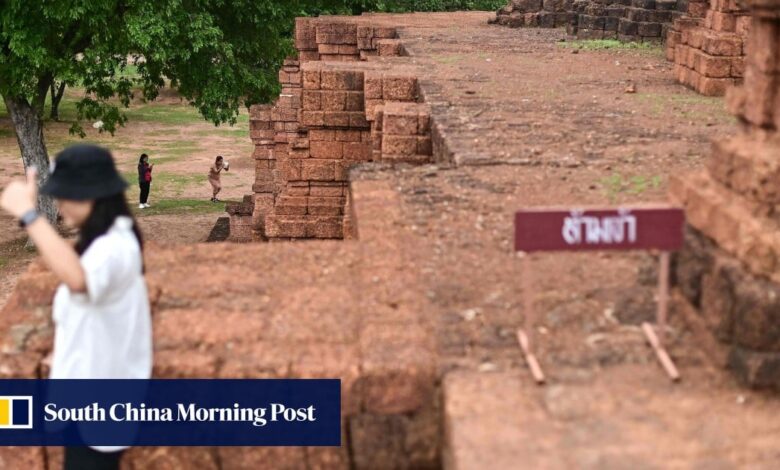Thailand mulls ban at Unesco site Si Thep after tourists climb sacred hill, angering locals

The 1,500-year-old complex of temples, monasteries and other buildings, located in Phetchabun province, some 200km north of Bangkok, was included in the United Nations cultural body’s world heritage list last week.
That decision prompted about 20,000 travellers to flock to Si Thep and Khao Klang Nok – a 20m high hill part of the historic spot and revered by local Buddhists – over the weekend.
The sightseers also clambered atop Khao Klang Nok, where age-old artefacts and stupas are located.
As Thai town joins Unesco list, site ‘completely unprepared’ for tourism
As Thai town joins Unesco list, site ‘completely unprepared’ for tourism
Si Thep district chief Weerawat Wattanawongphreuk said scaling the structure was inappropriate and measures to stop the practice could soon be rolled out.
“Personally, a ban would make this ancient place more valuable. Going up to the top [of the hill] is nothing. People just want to take pictures of the scenery. There’s not much of a benefit,” Weerawat said
“It is better to stay below and view this ancient place, which has been declared a world heritage site.”
Si Thep was once a thriving cultural and trading metropolis that celebrated Hindu and Buddhist beliefs. Archaeologists date the statues and buildings of the town, built by the Dvaravati civilisation, to between 1,500 and 1,700 years ago.
The site’s administration appeared to be caught off guard by the sudden jump in visitors, with complaints of inadequate parking spaces, public toilets and restaurants, The Bangkok Post reported.
“Went back and forth and couldn’t find a parking slot. Now the villagers have opened their homes where cars can be parked for 20 baht per vehicle,” said a Facebook user.
Phetchabun Governor Wison Kositanont lamented about the lost economic opportunity and called for the establishment of a community-driven tourist service centre.
“It’s really a pity that the local community couldn’t prepare in time, resulting in no facilities or services to benefit from the large number of tourists,” Wison wrote on Facebook.
Wison, one of the key officials who pushed for Si Thep’s addition to the Uneseco list, suggested income-generating activities like selling food and souvenirs, and other tourist services should be set up outside the site to make it a sustainable attraction.
Si Thep is the kingdom’s fourth site on the Unesco cultural heritage list. The agency already recognises historic Ayutthaya and Sukhothai towns, as well as the archaeological site Ban Chiang in northeastern Thailand.



 Offers free spin
Offers free spin